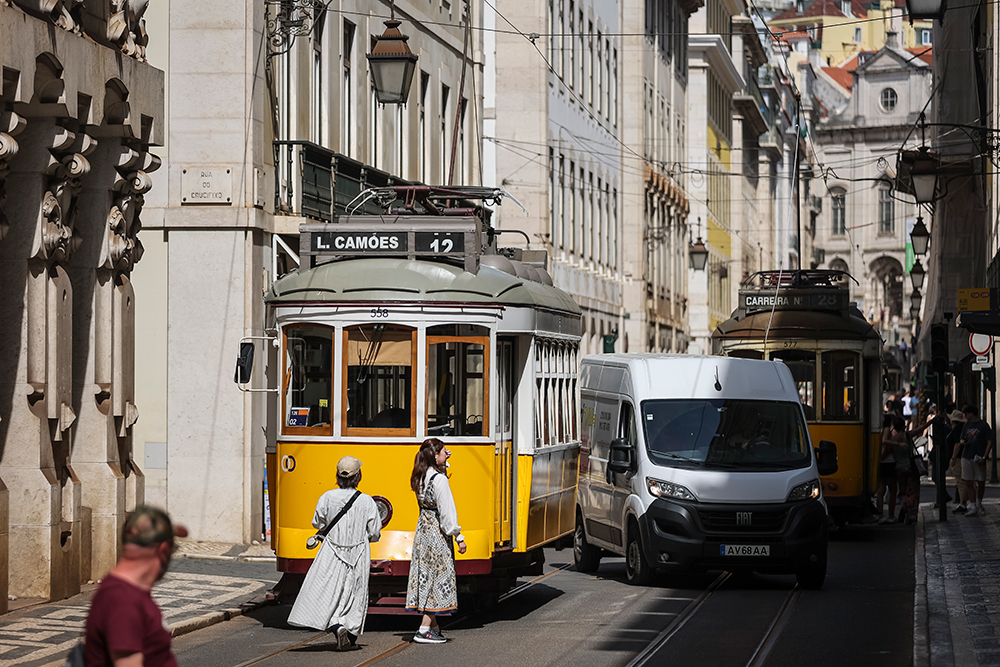
As I reached the final pages of the German writer Gregor Hens’s essayistic travelogue The City and the World, news of the blackout across Spain and Portugal snatched my attention. Madrid and Lisbon were at a standstill. Images of gridlocked round-abouts and commuters rushing out of pitch-dark subway tunnels plunged me into a fatalistic mood. When will it happen here? Hens, I realised, had nailed an important point: the ‘stunning complexity’ of modern cities makes them fragile. The metropolis, he writes, has become so intricate, its limits so stretched, that in it, ‘we are always living on the verge of catastrophe’.
A seasoned globetrotter who spent his formative years ‘guzzling jet fuel with abandon’, Hens has lived in cities around the world, from Berlin (his current home) to Los Angeles. He has visited a host of other far-flung locations, from Shanghai and Shenzhen to Las Vegas. Each place a person visits, Hens suggests, becomes plotted in the ‘galactic city’ of their mind, a network ‘whose intricately folded map actually offers the most surprising connections’.
This is urban wandering on a rather different scale to that of Charles Baudelaire, whose 1863 essay ‘The Artist, Man of the World’ paved the way for a host of successive writers, most notably Walter Benjamin, to delight in roaming a single city on foot. Hens takes stock of our modern technologically dictated movements within and across cities, investigating how these places have come to sprawl far beyond the possible step-count of even the most determined walker.
His understanding of the word ‘city’ encompasses entities that aren’t cities in the obvious sense: libraries, viruses, cemeteries and the brain. These each have ‘cityness’, apparently, because they are networks. Hens is careful to acknowledge that this insight owes something to the work of writers like Rebecca Solnit (‘a city is built to resemble a conscious mind… a network’) and Michel Foucault (‘our experience of the world is… that of a network’). His critique is bricolage-style: he makes incisive links between ideas, even if not quite delivering a decisive overriding argument of his own. This suits his subject. Cities are, he argues, constituted of ‘the rubble of history’, so are ‘no longer spatially and temporally comprehensible’ as a whole.
Messiness is, for Hens, what makes cities interesting. He sees Los Angeles, in its orderly layout, as an outlier, envying ‘anyone who manages to get lost’ in it. The greatest cities, it seems, allow room for the inhabitant or visitor to forge their own geography, one which overlaps with but doesn’t quite match what’s on Google Maps. Our encounters, Hens suggests, are many-layered and varied. Some cities, like New York, are so ingrained in the public imagination that ‘we first know [them] from our dreams’. Others, like Chongqing or Wuhan, are ‘generic cities’ that ‘arouse no longings’ for Hens. Mostly, though, we can know a city only ‘in an excerpted form’: outside of the webs we weave between bars and offices, homes and parks, much remains terra incognita.
This is Hens’s second book to be published in English and in it he has doubled down on a tested formula. In his 2015 memoir Nicotine (also elegantly translated by Jen Calleja), he surveyed his life as a smoker, using stories of memorable cigarettes like signposts in the mazy network of his experience. In The City and the World, the mechanism is essentially the same, but this time cities are the cigarettes.
It works and it doesn’t. On one level, the book satisfyingly blends memoir with literary criticism, travelogue and social commentary to create an experimental text reminiscent of other Fitzcarraldo Editions favourites such as Brian Dillon’s Essayism. At the same time this fragmentary approach, which jumps back and forth between different cities and does away with chapters, doesn’t feel quite as fresh as it did in Nicotine. That book’s central subject was precise and sexy enough to carry the reader through its more meandering passages. The concept of the city isn’t as tight – especially not once houses and children’s playgrounds are included in Hens’s definition. Yet his tentacular style makes sense as a response to the overstimulating, frenetic character of modern cities. How we think and live is mapped on to the metropolis. If the city is fragile, then we are too.







Comments